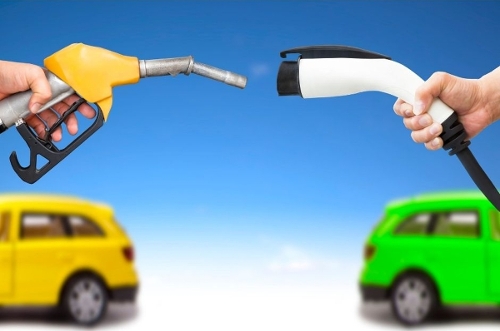
Hybrid vehicles a better option than full battery powered vehicles
By David T. Stevenson, Director
Center for Energy and Environmental Policy
December 14, 2021
Let's assume you want to reduce carbon dioxide (CO2) emissions with your choice of the vehicle you drive. Below is a comparison of hybrid vehicles compared to full battery powered electric vehicles, or EVs for short. The EVs offer essentially no emission savings while the hybrid vehicles do, along with significant cost savings on gasoline.
A common refrain is we must switch to EVs to minimize emissions. Federal legislation aims to spend billions on public EV charging stations and for subsidies up to $12,500 per EV to encourage people to buy this expensive option. Over 90% of all the EVs on the road are either Teslas or Chevrolet Bolts.
Let's compare the lifetime CO2 emissions of the Chevrolet Bolt (Bolt) to a comparable compact hatchback, the Honda Fit (Fit), with a gasoline-powered internal combustion engine (ICE).
The base price of the 2021 Bolt is $31,995 compared to the Fit at $16,500, for a premium price of $15,495, thus the need for a whopping subsidy to get anyone to buy a Bolt. The original tax credit was $7,500 for the first 200,000 vehicles produced. When the tax credit ran out, General Motors dropped the price of the Bolt $5,000 to today's price. You have to wonder what the price might be with a bigger tax credit.
The Bolt weighs a thousand pounds more than the Fit because of its 60 kWh battery pack. That means more wear on highways, but since the Bolt doesn't use gasoline, owners don't pay the highway repair and construction tax built into gasoline prices. That heavy battery requires mining, ore processing, shipping, and assembly that all emit CO2. A Swedish report, "The Life Cycle Energy Consumption and Greenhouse Gas Emissions from Lithium-Ion Batteries," summarized several studies and had determined battery manufacturing emissions will average 150-200 kg CO2-eq/kWh. That translates to 9.9 to 13.2 tons of carbon dioxide per Bolt or an 11.6-ton average.
The Bolt battery is warranted for eight years, or 100,000 miles. If you need a new battery due to capacity degradation, a new one will cost $15,734, excluding labor. The Bolt will need 27,778 kWh of electricity, with 90% of the charging done at home to travel 100,000 miles. The electricity generation emits CO2. The latest system mix of our regional grid marked up 21.5% for transmission and charging efficiency losses totals 1.09 pounds CO2 emissions/kWh, or 15.1 tons for 100,000 miles. So, over the eight-year period, the Bolt will have total emissions of 26.7 tons of CO2.
The Fit gets 36 miles per gallon of gasoline and will use 2,778 gallons of gasoline which emits 19.2 pounds/gallon, or 26.7 tons of CO2 for 100,000 miles. The lifetime emissions savings of the Bolt may be zero.
Subsidies for electric vehicles would primarily help wealthier families that can afford the high upfront cost of an electric vehicle. EV owners pay less to fuel their vehicles, avoid highway taxes paid at the fuel pump, and often get to drive alone in high occupancy vehicle lanes during rush hour. Others will pay for the tax credits and the missing highway construction funds and see no benefits since essentially no emissions are saved.
Some car manufacturers, led by Toyota, are following a different path focusing on hybrid vehicles with super-efficient internal combustion engines combined with a small battery assist. The Toyota Highlander with a six-cylinder traditional ICE gets 23 miles per gallon. The same vehicle in a hybrid version gets 35 miles per gallon, weighs 145 pounds more because of the battery, and costs $1,450 more.
With Toyota's decades of hybrid experience, they offer a 15- year, 150,000-mile warranty on the battery. At the same 12,500 miles per year used above, the extra cost of the hybrid will be repaid in about two and a half years, requiring no tax subsidy to encourage sales.
Over eight years, the hybrid will save 1,488 gallons of gas, or about 14.3 tons of CO2 emissions, less 1.7 tons for the smaller battery production for a net savings of 12.6 tons of emissions, and almost $4,500 in fuel savings at $3/gallon.
Want to save emissions and money without adding a heavy cost burden on others? Check out a hybrid vehicle.